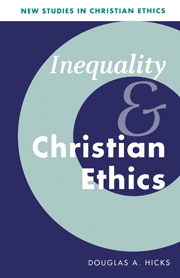Book contents
- Frontmatter
- Contents
- List of figures and tables
- Acknowledgment
- General editor' preface
- Preface
- List of abbreviations
- PART ONE CONTEXTUALIZING INEQUALITY
- PART TWO CONSTRUCTING A CHRISTIAN ETHICAL APPROACH
- PART THREE TRANSFORMING DISCOURSE, PERSONS, AND SOCIETIES
- 9 Expanding public discourse on inequality
- 10 An application: inequalities and human development
- 11 Conclusion: implications for inequality and Christian ethics
- Appendix A The Gini coefficient, inequality, and value-claims
- Appendix B Constructing Gini coefficients in income, education, and health/longevity
- Appendix C The construction of the HDI and the IAHDI
- Bibliography
- Index
10 - An application: inequalities and human development
Published online by Cambridge University Press: 05 June 2012
- Frontmatter
- Contents
- List of figures and tables
- Acknowledgment
- General editor' preface
- Preface
- List of abbreviations
- PART ONE CONTEXTUALIZING INEQUALITY
- PART TWO CONSTRUCTING A CHRISTIAN ETHICAL APPROACH
- PART THREE TRANSFORMING DISCOURSE, PERSONS, AND SOCIETIES
- 9 Expanding public discourse on inequality
- 10 An application: inequalities and human development
- 11 Conclusion: implications for inequality and Christian ethics
- Appendix A The Gini coefficient, inequality, and value-claims
- Appendix B Constructing Gini coefficients in income, education, and health/longevity
- Appendix C The construction of the HDI and the IAHDI
- Bibliography
- Index
Summary
A CONSTRUCTIVE PROPOSAL: THE INEQUALITY-ADJUSTED HUMAN DEVELOPMENT INDEX
As policy-oriented discussions of inequality become more specific and technical, the insights of Christian social ethics seem less direct. Yet in fields such as international development, it is necessary for policymakers, analysts, and citizens to apply ethical frameworks and insights to very specific problems and issues. Statistical analyses of poverty, water pollution, infant mortality, and the like, as well as rules and regulations for programs to overcome such problems, are framed in a specific way and thus reflect a number of values about what aspects of life are morally significant. Even such technical discussions related to inequality and other economic issues should be consistent with moral frameworks deemed acceptable by the relevant parties.
Insights from the Christian ethical approach developed in the book can be applied to public and policy-oriented discussions. As just one example of how the approach could make a contribution, this chapter provides a constructive proposal for including attention to inequality in the evaluation of genuine, lasting, equitable “human development.” The proposal builds on the ongoing project of the United Nations Development Programme (UNDP) and its framework of the current “human development index” (HDI). This index and the UNDP reports that support it have become widely used by governments and non-governmental organizations (NGOs) as they determine economic and social programs.
By expanding that index into an “inequality-adjusted human development index” (IAHDI), this chapter demonstrates how attention to particular values can help to shape an important discourse about the meaning of well-being and development.
- Type
- Chapter
- Information
- Inequality and Christian Ethics , pp. 215 - 230Publisher: Cambridge University PressPrint publication year: 2000



